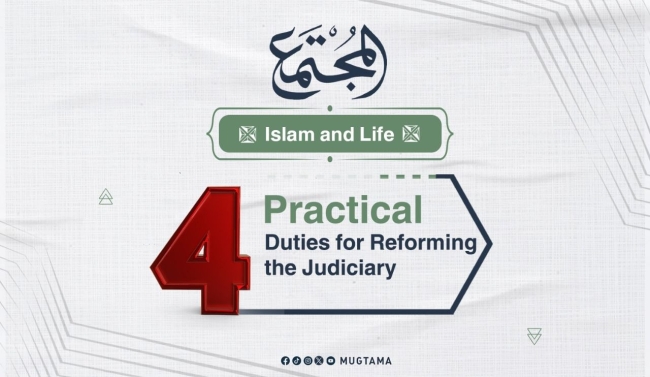4 Practical Duties for Reforming the Judiciary Featured
It is evident to every sensible person that theoretical study requires practical application to test its validity. It is also evident that practical implementation based on randomness and deliberate neglect of theoretical principles and original scientific studies does not lead to safety and success, but rather to destruction and ruin.
In the field of judicial reform, theoretical foundations should be supplemented with practical duties that contribute to achieving the desired outcome. Some of the practical duties for reforming the judiciary are as follows (1):
1. Regulating Laws and Judicial Rulings:
Practical reform of the judicial system requires amending some existing laws and enacting new laws that align with Islamic Sharia. This task requires the concerted efforts of judges and addressing family problems, divorce dilemmas, alimony issues, and inheritance crises. It involves consulting the opinions of jurists from all schools of thought to choose what is best for people with deep insight into the secrets of legislation.
Additionally, organizing Sharia courts from a legal and systematic perspective can greatly alleviate the hardships and complexities people face due to the rigidity of some texts and the complexity of litigation procedures.
Regulating judicial rulings requires enhancing the practical efficiency of judges through court inspections. This can be achieved by requiring each court to submit a monthly summary of each case and the court's ruling. These summaries should be reviewed by a higher committee to verify correctness and review any errors. Judges should be provided with feedback and guidance on how to handle similar cases in the future.
2. Reconciliation Between Disputants:
Reconciliation between disputants before issuing judgments helps regulate the judicial system, based on Allah's saying: "And if it returns, then make settlement between them in justice" (Al-Hujurat: 9). If two Muslims or groups fight, the leader should reconcile between them according to the Book of Allah and with good advice and removing doubts.
The divine law for resolving marital disputes relies on reconciliation, as Allah says: "And if you fear dissension between the two, send an arbitrator from his people and an arbitrator from her people. If they both desire reconciliation, Allah will cause it between them. Indeed, Allah is ever Knowing and Acquainted [with all things]" (An-Nisa: 35).
Imam Muhammad Abduh advised his student Muhammad Al-Maraghi before his travel to Sudan to take up a judicial position in 1904, saying: "I advise you to be more of a guide to the people than a judge. If you can resolve disputes with reconciliation, do not resort to judgment, for judgments cut off relations between families, while reconciliation heals and mends wounds (2)." Therefore, reform in the judicial system does not rely solely on issuing correct judgments but also extends to guiding disputants towards what is beneficial and good.
3. Ease in Issuing Fatwas:
Ease in issuing fatwas is an important practical means for reforming the judicial system because it contributes to alleviating people's hardships. The rules established by jurists were meant for the benefit of humanity and to regulate their mutual relationships. Therefore, they should cater to necessity and aim to relieve people's hardships. Judges should rule according to texts that alleviate people's burdens, as Islam advocates ease, not hardship. Allah says: "Allah intends for you ease and does not intend for you hardship" (Al-Baqarah: 185) and "And Allah wants to lighten for you [your difficulties]; and mankind was created weak." (An-Nisa: 28).
The Prophet (peace be upon him) sent Mu'adh and Abu Musa to Yemen and instructed them: "Make things easy and do not make them difficult; gladden and do not scare; comply with one another and do not disagree." (3) This hadith emphasizes ease and gentleness.
Therefore, Islamic jurisprudence principles are based on ease and removing hardships (4). A mufti should search for everything in the jurists' opinions that promotes ease for people, and a judge should choose the opinions that serve people's interests and alleviate their hardships.
Some jurists even allowed judges to apply a weak opinion in the jurisprudential school when necessity is confirmed, provided that the purpose is not to follow desires or worldly gains (5). This encourages considering people's circumstances and being gentle and easy in judicial rulings.
4. Islamic Example in Judicial Practices:
Undoubtedly, leading by example and behavior has a greater impact and stronger argument than mere words. The condition of one individual serving as a role model in a group of a hundred has more influence than a hundred speakers addressing one person.
Judicial reform is only halfway complete with legal reforms; the other half lies with the judge's integrity. The judge must understand the facts accurately, weigh the evidence, and avoid delaying justice. He must instill confidence in people and make them accept his rulings, even if they are against them, by maintaining good conduct and avoiding suspicions (6).
This emphasizes that laws alone are not enough to build people's trust in the judiciary. The judge's integrity, impartiality, and reputation for fairness are crucial for gaining public confidence in judicial rulings.
-------------------------------------------------------------
(1) Principles of Judicial System Reform: Dr. Ramadan Hameda Muhammad, p. 18.
(2) Al-Maraghi, Sheikh of Al-Azhar: Muhammad Kurd Ali, p. 299.
(3) Agreed upon, narrated by Imam Al-Bukhari (4086) and Muslim (1733).
(4) Al-Muwafaqat: Al-Shatibi (1/520).
(5) Ijtihad in Islam, p. 39.
(6) Islamic Renaissance in the Lives of its Contemporary Figures: Dr. Muhammad Rajab Al-Bayoumi (1/427).







